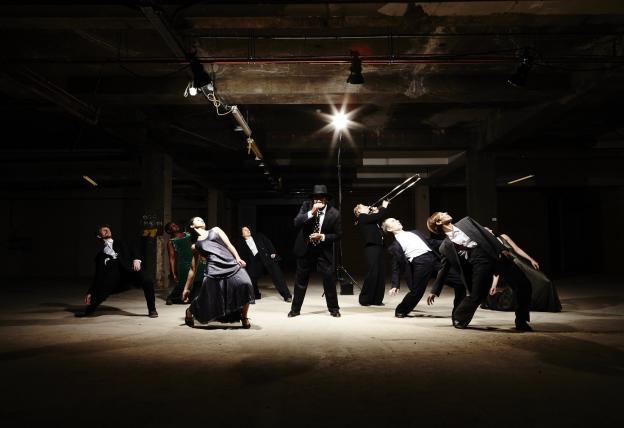‘You are nothing but a big zero,’ says the Fool to Lear. I paraphrase, apologies Mr Shakespeare. But this is not, you understand, a version of King Lear, although that was the starting point – a period of research supported by the Royal Shakespeare Company, in which Clod Ensemble discovered that what they didn’t want to do was make a version of the play.
What they’ve done instead is take the play’s five-act structure, some of its themes (jealousy, desire, father/daughter dynamics, sibling rivalry, the absent mother), and some of its motifs and metaphors (weather, nature, storms) to create Zero, which has been commissioned by Sadler’s Wells and Brighton Festival, in collaboration with South East Dance. I see it on its second ever performance, and it does feel very new and, to be honest, not quite cooked yet. Actually, even more crucially, there are some fundamental flaws in the piece…
It’s an end-on piece presented in a large space (as in large stage and large auditorium). The large performance space is familiar territory for Clod, but many of their works (An Anatomie in Four Quarters, Red Ladies, Under Glass) are presented in spaces that are shared with small audience groups, or, in the case of shows in which the audience is in a more traditional seated auditorium, that have an intense and intimate feel (for example, in two of their collaborations with Split Britches – Must, and It’s a Small House and We Lived in it Always). Zero tackles the big stage / big auditorium dynamic by going for a full-on visual and aural assault with things happening all over the place, and hardly a chance for the audience to draw breath or take in what they are experiencing. Certainly, when it comes to the physical action anyway, as soon as something interesting starts, it stops, or is interrupted.
As always with Clod, this show is a collaboration between the company’s two co-directors, composer Paul Clark and movement theatre director Suzy Wilson – and as always the two artforms are both of equal importance. It is – despite the fact that it is supported by Sadler’s Wells and South East Dance – not a contemporary dance piece; it is a total theatre piece, in which the aural, visual and physical elements interweave harmonically.
At least, that’s what it should be. At the moment, the movement work feels much too far into the contemporary dance camp for comfort, and to a contemporary dance that feels pretty dated: there are rather too many references to Pina Bausch’s gestural dance; too many sections of choreography that doggedly tag and illustrate the blues-inspired score; too many references to popular dance (Charleston, for example) that get repeated too many times; too many clichés of contemporary dance and theatre (such as the stopping-another-dancer-in-her-tracks intervention so beloved of Wendy Houston/Forced Entertainment). I often find myself thinking that I’ve seen so much of this choreography so many times before. It is almost as if Suzy Wilson hasn’t quite allowed herself to do what she does best – make visual/physical theatre that uses dance as one of its elements, rather than dance per se.
And yet despite the criticisms I enjoyed a lot about Zero. I loved the robust and earthy music, played by a group of seven musicians that includes legendary harmonica player Johnny Mars and trombonist Annie Whitehead; I loved the energy of the performers, and mix of bodies of different ages and sizes and experiences onstage (the ensemble including Clod favourites like Zoe Bywater and new company members such as Antonia Grove); I enjoyed the soundtrack of found or recorded texts from many different sources (including clips of siblings Jackie and Joan Collins, and the Kray brothers) that were cleverly edited and placed in counterpoint to the live music. There are some lovely hero/chorus ensemble sequences, some good same-sex duets exploring power struggles within relationships, and some great solo vignettes – I particularly enjoyed the Hebrew rant by charismatic Israeli actor/dancer Uri Roodner.
So there is a lot to like in Zero, yet still it feels lacking. Previous Clod Ensemble shows bear the mark of a highly talented director of physical theatre, a marvellous manipulator of bodies and spaces; Zero suffers a little from Suzy Wilson being cast (or casting herself) as a contemporary dance choreographer, and falling a little short. More visual theatre, less contemporary dance please, Clod!

